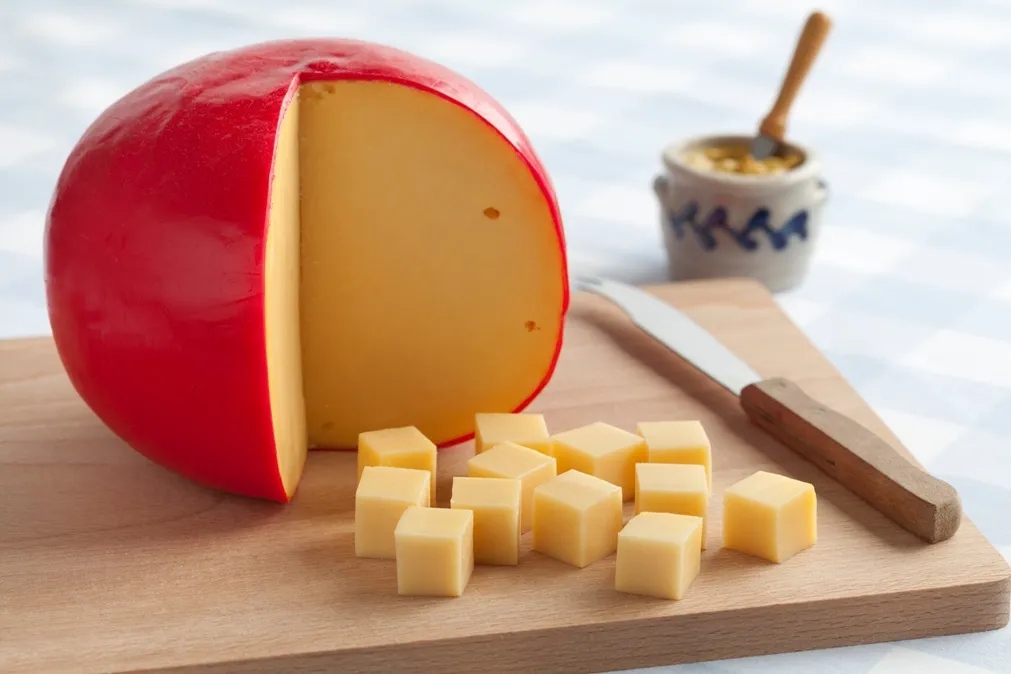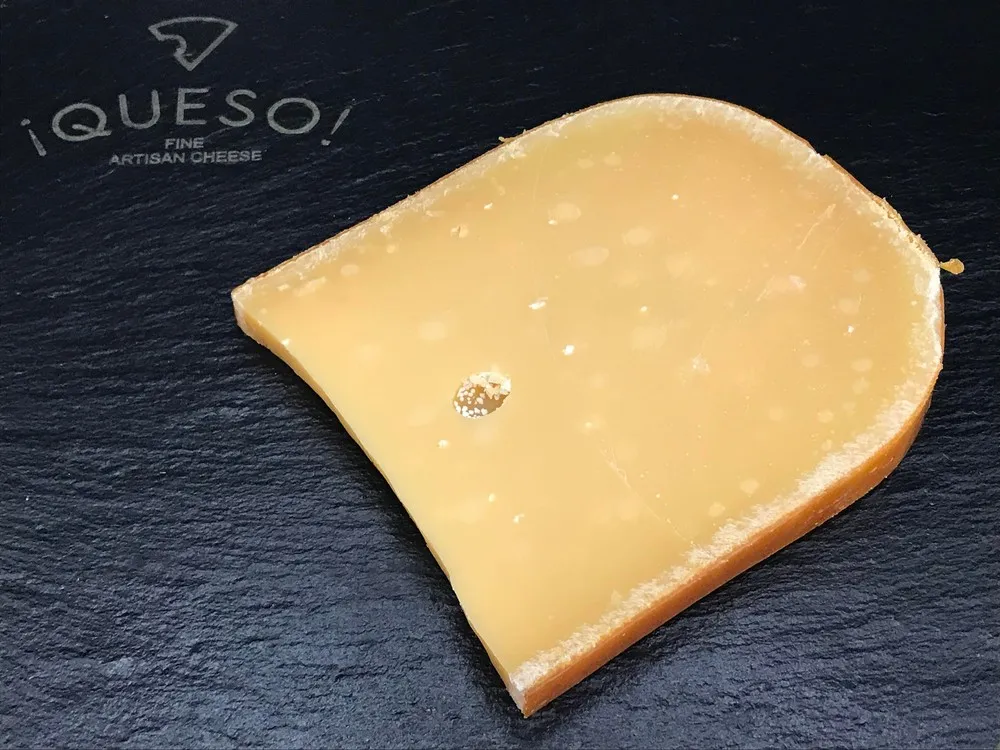Emmental
-
Country of origin: Switzerland
-
Made from cow's milk
-
Type: semi-hard
What is Emmental Cheese? What Does Emmental Taste Like?
Emmental, a semi-hard cheese with a rich and storied tradition, is a popular type of cheese known for several distinct characteristics. Originating in Switzerland, it has gained worldwide recognition for its unique taste and appearance. It is known for its well-known for its characteristic holes or ‘eyes.’ Traditional Emmental is made from unpasteurized milk, but Emmental-alike versions are made from pasteurized cow's milk, especially in the USA. It is a common ingredient in fondue and is frequently used in sandwiches, quiches, gratins, and cheese plates. It melts well, making it a popular choice for cheese sauces and toppings.
Various types of Emmental are produced in different regions. Each variety of the cheese is identified via geographical areas and include:
- Switzerland: Emmentaler AOC
- Bavaria, Germany: Allgäuer Emmentaler PDO
- Savoie, France: Emmental de Savoie IGP
- Franche-Comté, France: Emmental français Est-Central PGI
If you're curious about what makes Emmental cheese so exceptional, you've come to the right place. In this article, we'll delve into the details of what Emmental cheese tastes like, the type of cheese it is, how long it lasts, what it is used for, why it has holes, and where it comes from, connecting you to its rich heritage.
What Does Emmental Cheese Taste Like?
When it comes to taste, Emmental offers a delightful experience for cheese enthusiasts. It has a mild, nutty, and slightly sweet flavor with a creamy and somewhat firm texture. The flavor can vary depending on the age of the cheese, with the aging period ranging from 2 to 18 months. Younger Emmental has a milder taste, while older varieties have a more robust, pronounced flavor.
This distinct nuttiness stems from the raw milk used in the cheese-making process. As the cheese ages, its flavor becomes more pronounced, developing a rich depth that lingers on the palate. The texture of Emmental cheese is smooth and firm, with a slightly elastic consistency. It is easily sliceable, making it perfect for sandwiches or cheese platters.
Emmental, also known as Emmentaler or Emmenthal, originates from the Emmental region in Switzerland. This iconic cheese is characterized by its signature holes, known as "eyes," which are formed during the fermentation process. These holes are a result of the carbon dioxide produced by the bacteria used in the cheese-making process. The size of the eyes varies, with larger eyes indicating an extended maturation.
When tasting Emmental cheese, you may also notice subtle fruity undertones that add a touch of sweetness to the overall flavor profile. This complexity is a result of the specific blend of bacteria and yeasts used in the fermentation process. Additionally, the aging process of Emmental can range from a few months to over a year, with longer-aged varieties boasting a more intense flavor and a crumbly texture. Whether enjoyed on its own or paired with fruits and nuts, Emmental is a versatile option that is sure to please any cheese connoisseur.
What Type Of Cheese Is Emmental?
Emmental is a semi-hard Swiss cheese made from raw cow's milk. The cheese-making process involves using raw milk, cultures, rennet, and a specific strain of bacteria. The cheese is then aged, allowing it to develop its unique flavor and texture.
Emmental is best known for its somewhat iconic appearance, characterized by its signature holes or "eyes." These holes are formed during the fermentation process when carbon dioxide is released by the bacteria culture added to the milk. The size of the holes varies depending on the specific production methods used by different cheese makers. Emmental is often praised for its nutty and slightly sweet flavor profile, making it a versatile cheese that can be enjoyed on its own or melted into a variety of dishes.
When it comes to pairing Emmental cheese, it complements a range of foods and beverages. This cheese pairs beautifully with fruits such as apples, pears, and grapes, as well as with nuts like walnuts and almonds. Emmental also works well with crusty bread, cured meats, and a variety of wines, including Riesling, Pinot Noir, and Chardonnay. Whether served as part of a cheese platter or melted into a classic fondue, it will surely delight cheese lovers with its rich history and delicious taste.
How Long Does Emmental Cheese Last?
Like many kinds of cheese, the shelf life of Emmental varies depending on how it is stored. When stored properly in a cool and dry place, unopened Emmental cheese can last up to several months. However, once the cheese is opened, it is best to consume it within a few weeks to ensure optimal taste and quality. To ensure the longevity of Emmental cheese, it is recommended to wrap it tightly in wax paper or plastic wrap and store it in the refrigerator. This will help prevent the cheese from drying out or absorbing odors from other foods.
What Is Emmental Cheese Used For?
Emmental is a versatile cheese used in a variety of culinary creations that inspire creativity in the kitchen. Its mild and nutty flavor pairs well with a range of ingredients, making it a popular choice for cooking, baking, and snacking. Emmental cheese is often used in fondue, where it melts beautifully, creating a smooth and creamy texture. It can also be grated and sprinkled over pasta dishes, added to sandwiches, or enjoyed on a cheese board. Additionally, Emmental cheese can be sliced and enjoyed on its own or paired with fruits, nuts, and crackers, encouraging you to explore its many uses.
Why Does Emmental Have Holes?
One of the most intriguing aspects of Emmental cheese is its iconic holes. These holes, also known as "eyes," are a result of a fascinating process. The bacteria used in making Emmental cheese produces gas as it consumes the lactose in the milk during fermentation. As the cheese ages, the gas is trapped within the curds, causing the formation of bubbles. The larger the bubbles, the bigger the holes in the cheese. The unique appearance of Emmental cheese with its holes adds to its appeal and creates a visually exciting cheese, sparking your curiosity about its production process.
Where Is Emmental Cheese From?
Emmental has its origins in the Emmental region of Switzerland. The region's ideal climate, lush green pastures, and rich soil provide the perfect conditions for dairy farming. The tradition of cheesemaking in the Emmental region dates back centuries and continues to thrive today. Emmental cheese is also produced in other countries, but authentic Emmental comes from Switzerland. The PDO (Protected Designation of Origin) label signifies that the cheese has been created in a specific region following traditional methods and using specified ingredients.
Emmental cheese is a unique and widely recognized cheese that offers a delightful taste experience. With its nutty flavor and firm yet smooth texture, it is a versatile cheese that can be enjoyed in various culinary creations. The iconic holes in Emmental cheese are a result of the fermentation process, adding to its visual appeal. Whether used in fondue, grated over pasta, or enjoyed on a cheese board, Emmental cheese brings a touch of Swiss tradition and flavor to any dish.

Over 200,000 page views per month, Put your store on our map!
Contact UsOther cheeses from Switzerland:
Emmental cheese, with its distinctive holes and nutty flavor, is a beloved Swiss cheese that is often used in a variety of dishes, including fondue and sandwiches. However, suppose you find yourself in a situation where Emmental cheese is not available, or you simply want to try something different. In …
Read MoreEmmental Q & A
-
Is Emmental Lactose-Free?
Lactose intolerance can be a challenging dietary restriction to navigate, especially for cheese lovers. Emmental cheese is relatively low …
Read More -
Is Emmental Vegetarian?
For individuals following a vegetarian diet, ensuring that their food choices align with their principles is crucial. Emmental cheese, …
Read More -
Is Emmental Gluten-Free?
Gluten-free diets are essential for individuals who have celiac disease or gluten sensitivity. Fortunately, Emmental cheese is naturally gluten-free. …
Read More -
Does Emmental Melt?
If you're a fan of melting cheese over dishes or including it in recipes, you’ll be pleased to learn …
Read More -
How To Store Emmental
Proper storage and handling are key to maintaining the quality and taste of Emmental cheese. To extend its shelf …
Read More -
How Long Can Emmental Sit Out?
Proper food safety practices are crucial when it comes to dairy products and leaving Emmental cheese unrefrigerated for extended …
Read More -
Can You Freeze Emmental?
Life can get busy, and it's not uncommon to have extra Emmental on hand so, freezing can be a …
Read More -
Can Dogs Eat Emmental?
As a dog owner, you might be tempted to share just about anything with your furry companion. While a …
Read More -
Can Cats Eat Emmental?
If you're a cat owner, you may wonder if it is safe for your feline friend to indulge in …
Read More -
Can You Eat Emmental While Pregnant?
During pregnancy, it's natural to be cautious about your diet. Rest assured, most Emmental cheese is safe to consume …
Read More






